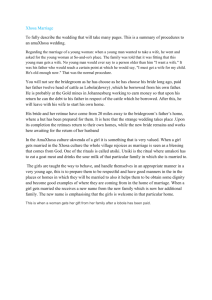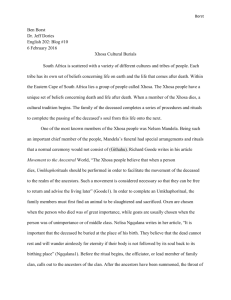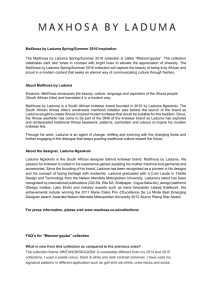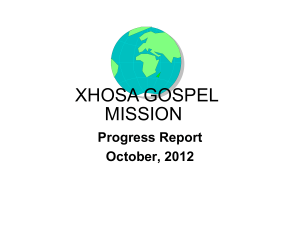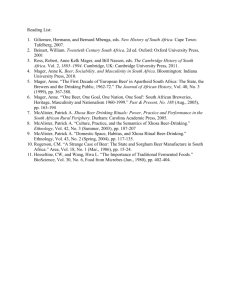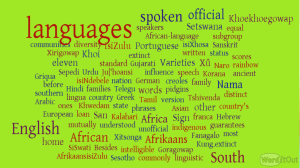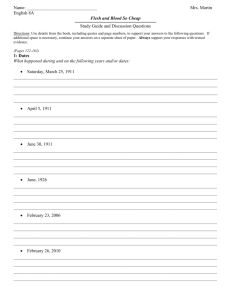Xhosa Oral Poetry & the Image of the Book
advertisement
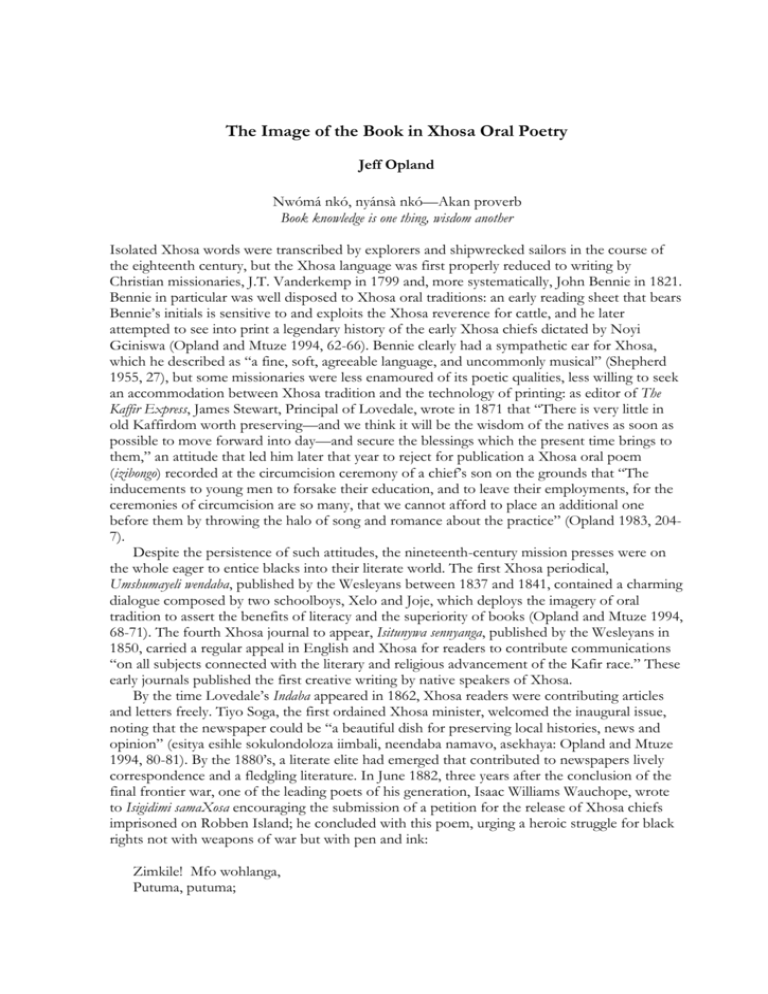
The Image of the Book in Xhosa Oral Poetry Jeff Opland Nwómá nkó, nyánsà nkó—Akan proverb Book knowledge is one thing, wisdom another Isolated Xhosa words were transcribed by explorers and shipwrecked sailors in the course of the eighteenth century, but the Xhosa language was first properly reduced to writing by Christian missionaries, J.T. Vanderkemp in 1799 and, more systematically, John Bennie in 1821. Bennie in particular was well disposed to Xhosa oral traditions: an early reading sheet that bears Bennie’s initials is sensitive to and exploits the Xhosa reverence for cattle, and he later attempted to see into print a legendary history of the early Xhosa chiefs dictated by Noyi Gciniswa (Opland and Mtuze 1994, 62-66). Bennie clearly had a sympathetic ear for Xhosa, which he described as “a fine, soft, agreeable language, and uncommonly musical” (Shepherd 1955, 27), but some missionaries were less enamoured of its poetic qualities, less willing to seek an accommodation between Xhosa tradition and the technology of printing: as editor of The Kaffir Express, James Stewart, Principal of Lovedale, wrote in 1871 that “There is very little in old Kaffirdom worth preserving—and we think it will be the wisdom of the natives as soon as possible to move forward into day—and secure the blessings which the present time brings to them,” an attitude that led him later that year to reject for publication a Xhosa oral poem (izibongo) recorded at the circumcision ceremony of a chief’s son on the grounds that “The inducements to young men to forsake their education, and to leave their employments, for the ceremonies of circumcision are so many, that we cannot afford to place an additional one before them by throwing the halo of song and romance about the practice” (Opland 1983, 2047). Despite the persistence of such attitudes, the nineteenth-century mission presses were on the whole eager to entice blacks into their literate world. The first Xhosa periodical, Umshumayeli wendaba, published by the Wesleyans between 1837 and 1841, contained a charming dialogue composed by two schoolboys, Xelo and Joje, which deploys the imagery of oral tradition to assert the benefits of literacy and the superiority of books (Opland and Mtuze 1994, 68-71). The fourth Xhosa journal to appear, Isitunywa sennyanga, published by the Wesleyans in 1850, carried a regular appeal in English and Xhosa for readers to contribute communications “on all subjects connected with the literary and religious advancement of the Kafir race.” These early journals published the first creative writing by native speakers of Xhosa. By the time Lovedale’s Indaba appeared in 1862, Xhosa readers were contributing articles and letters freely. Tiyo Soga, the first ordained Xhosa minister, welcomed the inaugural issue, noting that the newspaper could be “a beautiful dish for preserving local histories, news and opinion” (esitya esihle sokulondoloza iimbali, neendaba namavo, asekhaya: Opland and Mtuze 1994, 80-81). By the 1880’s, a literate elite had emerged that contributed to newspapers lively correspondence and a fledgling literature. In June 1882, three years after the conclusion of the final frontier war, one of the leading poets of his generation, Isaac Williams Wauchope, wrote to Isigidimi samaXosa encouraging the submission of a petition for the release of Xhosa chiefs imprisoned on Robben Island; he concluded with this poem, urging a heroic struggle for black rights not with weapons of war but with pen and ink: Zimkile! Mfo wohlanga, Putuma, putuma; Yishiy’ imfakadolo, Putuma ngosiba; Tabat’ ipepa ne inki, Lik‘aka lako elo. Ayemk’ amalungelo, Qubula usiba; Nx‘asha, nx‘asha, nge inki, Hlala esitulweni, Ungangeni kwa Hoho Dubula ngo siba. Tambeka umhlati ke, Bambelel’ ebunzi; Zigqale inyaniso, Umise ngo mx‘olo; Bek’ izito ungalwi, Umsindo liyilo. Your cattle are plundered, compatriot! After them! After them! Lay down the musket, take up the pen. Seize paper and ink: that’s your shield. Your rights are plundered! Grab a pen, load, load it with ink; sit in your chair, don’t head for Hoho: fire with your pen. Press on the page, engage your mind; focus on facts, and speak loud and clear; don’t rush into battle: anger talks with a stutter. (Wauchope 2008) By the end of the nineteenth century, a generation of mature Xhosa writers had evolved who appropriated the technology of print (Opland 2003): two independent weekly newspapers controlled by black editors, Imvo zabantsundu in King William’s Town and Izwi labantu in East London, made major contributions to the development of Xhosa literature. With three obscure exceptions, no original secular literature was published in book form throughout the nineteenth century. In the first decade of the twentieth century, however, the first Xhosa novel appeared, and W.B. Rubusana paid for the printing of his pioneering anthology, Zemk’inkomo, magwalandini! which contained not only a substantial retrospective selection of literature culled from newspapers but also a peerless collection of praise poems, a salutary reminder that while Xhosa literature was evolving in the pages of newspapers, Xhosa oral poets continued to exercise their craft unaffected by encroaching literacy (Opland 2004 and 2007a). The Xhosa oral poet (imbongi) operated in the service of a centripetal, rural ethnic group (Opland 1983 and 1998). He fostered positive group identity in part by critical references to divergences from the norm, or by denigration of outsiders. The principal identifying “other” throughout the nineteenth and for most of the twentieth century has been the white population. If the technology of print introduced by whites was eager to absorb Xhosa oral traditions, and if in the course of time it nurtured black contributors to the print media, what, one might ask, was the complementary attitude of Xhosa oral poetry to white culture? What was the Xhosa imbongi’s response, specifically, to the book? How did indigenous Xhosa literary technology (oral tradition) view the foreign white literary technology (the print media)? Throughout its discernible history, oral izibongo has tended to operate largely free of white influence or control, in defiance of such control or indifferent to it. Xhosa traditions of praise poetry have not succumbed to the perceived threat of literacy and the culture of the printed book over two centuries of co-existence, generally maintaining independence of the white media of literary transmission, and only occasionally entering the world of the book. This article examines first the depiction of the book in nineteenth-century Xhosa praise poetry, then considers the cases of two literate twentieth-century poets, Nontsizi Mgqwetho, a Christian woman writing in Johannesburg in the twenties who can recommend the Bible to her readers but also decry it as an agent of cultural dispossession, and David Yali-Manisi, a prolific author but also an imbongi in whose oral izibongo (recorded in the 1970s and 1980s) the book and writing continue to serve, as they do in nineteenth-century izibongo, as symbols of white deception. The praise poems of nineteenth-century Xhosa chiefs first published by Rubusana in 1906 (I am indebted to David Yali-Manisi for his assistance with the translation of these poems) are not concerned with whites and white culture in their own right: the izibongo studiously ignore white affairs, chronicling the local rather than the national scale of events. Aspects of white culture receive comment or attention only when they impinge on local individuals or politics. Chiefs are often characterised through their interaction with whites, praised for their resistance to white control, or blamed for collaboration, or for their capitulation to white corruption. Matanzima son of Sandile, for example, is referred to approvingly as Ixónti laseBholo, Intw’ ede yaf’ ingazang’ iráfe (Rubusana 1911, 251) Long-hair from Bholo who never paid tax all his life. In similarly approving terms, Sigcau son of Sarili is Nguzwi-linzima elibizwa pákati Uxális’ imantyi ngokupéndula (Rubusana 1911, 234) called Powerful Voice at home: he disturbs the magistrate by answering back, and the resistance of Páto son of Cúngwa is praised: NguMandoli akavunyw’ emlungwini, Uyakuz’ abanjwe nyak’ abonwayo (Rubusana 1911, 312) He’s Mandoli disagreeable to whites: he’d be arrested on sight. On the other hand, Ngqika son of Mlawu’s policy of collaboration with the whites elicits from the poet the following characterisation: Umpámbani nencúka zigoduka, Untsimangwana yakwa-Nkwebu (Rubusana 1911, 245) He’s chummy with scavengers, an imp familiar with strangers, and Toyise son of Gasela is criticised for handing offenders over to white justice: Kulamahlat’ inkawu zimangele, Kuba nizibamba nizis’ em-Lungwini, Zibe zingadlanga nto yamlungu. (Rubusana 1911, 273) In these woods the monkeys complain: you seize them and send them to whites, though they ate nothing belonging to whites. Chiefs are criticised for succumbing to white liquor. The ways of Maqoma, warrior son of Ngqika, “are strewn with broken bottles” (kundlel’ ezinamaqékez’ ebótile, Rubusana 1911, 261) and Ndimba son of Mhala, in a passage marked by passive verbs, presents a pathetic picture of degeneracy, completely subservient to white administrators, who supply him with money for drink: Lomntwan’ akavunywa nanguyisekazi, Akavunywa ngu-Makeleni pesha kwe-Qonce, Selefumana wahlala kwa-Tshalisi, Nay’ umtánda ngokubátala. Ngumntan’ uhlal’ enkantini kwa-Keli, Uhlalel’ ukukátywa li-Jamani. (Rubusana 1911, 272) This child’s own uncle expels him, Maclean expels him across the Buffalo. He takes up quarters with Charles, whom he loves for giving him cash. He’s a child who lives in Kelly’s canteen, enduring the German’s kicks. Whites of course are frequently referred to in the context of battle, as the enemy to be guarded against. Mqikela son of Ndayi is Nguntonga zipáteni ngonxelazana, Lumkani kuyiw’ ezibukweni, Umkos’ wabelung’ uyalalela. (Rubusana 1911, 278) sticks borne in the left hand: watch out, we’re approaching the ford, where the white army always lurks. In this martial context the white man’s rifle frequently attracts comment. Rifle wounds are red badges of courage. Xhoxho son of Ngqika is Ngu-Nokuzingabila, uxaba wakwa-Xunge, Utyumz’ umtúma womlungu. Intw’ enxeba lisentloko ngesinandile. (Rubusana 1911, 250) Barrier barring the enemy, he prepares white medicines: his head bears the wound of a gun, and Sibhozo son of Mnzabele is Luqóqó lwenyati, inxeb’ elisabóbó lisemhlana, Lidutyulwe nge-Lefele, lompu mhle wasem-Lungwini. (Rubusana 1911, 239) a wounded buffalo with scoured back, shot by Rifle, the white man’s fine gun. Naturally enough, the rifle is a feature of white destruction and dispossession. The izibongo of Sarhili son of Hintsa depicts the chief as the victim of Mfengu collaboration with the whites. The last frontier war started in 1877 with a domestic dispute between Sarhili’s Gcaleka and the Mfengu living in his territory, and ended with the expulsion of the Gcaleka from their ancestral land. In this compressed sequence, bitter with irony, Sarhili complains of the Mfengu’s special relationship with the whites, war breaks out, and finally British authority in the person of Sir Bartle Frere evicts Sarhili. Zindinqenil’ izizwe zade zaxelelana, Zindinqenil’ izizwe zade zacel’ umlungu, Ukuze ziti-nje zakulil’ izinandile, Abizw’ u-Fulele kutwe wayek’ ama-Mfengu, ’Kub’ ohlwaywa ngu yise, owawafak’ ekwápéni mhlana afika; Kukuze lixole ngo-Ncha-Yecíbi, isizwe siwel’ u-Mbáshe. (Rubusana 1911, 232) “. . . Nations who feared me plotted against me, nations who feared me appealed to the whites.” So when the guns rumbled Frere warned you off the Mfengu, who’d been harmed by your father’s welcome: after Ngcayechibi’s war, the nation crossed the Mbhashe. If the rifle is an image of destruction, so too is the written word, the book or the letter. Writing is not to be trusted: Nowawe son of Ndlambe is Ngundab’ encwadini ziyinto eninzi, Zincinan’ indaba eziyinyaniso. (Rubusana 1911, 271) news in a letter about many things, but not much of the news is the truth. Writing is associated with witchcraft in the izibongo of Ngangelizwe son of Mthikrakra, who is referred to as Ngumbál’ incwadi yadlob’ enkundleni Ko-Mateza, yayiya kutób’ ubugqi Bakwa-Mshweshwe kobe-Nduku (Rubusana 1911, 293) The writer of the book who gambols in Mateza’s court, bewitching Mshweshwe’s and Nduku’s people, and the book is associated with war in these lines from the izibongo of Sarhili son of Hintsa: Incwadi yemfazwe ibomvu ngegazi, Ibe zililo kwabase-Mlungwini (Rubusana 1911, 232) The book of war is red with blood: there was weeping among the whites. Writing is used for treaties, which cannot be trusted and are often, like the rifle, agents of dispossession. Ngangelizwe’s poem notes that Ilizwe lafa ngo-Makála kwa-Tato, Kwabálw’ incwadi kwanikwa u-Mpíti. (Rubusana 1911, 294) The land was destroyed by Makala from Tato’s: a book was written and given to Mpiti, and Sandile’s poem remarks scornfully on the proliferation of treaties since the time of his father Ngqika: Sandile is Nguzwe loniwe ngo-Kondile, Ukuze zibe nkosana zonke zipát’ incwadi, Kant’ incwad’ ifud’-ibany’ ingene ngo-Ngqika (Rubusana 1911, 249) the country upended by Calderwoods: now every chiefling gets a book, where once only Ngqika received one. In the following devastating portrait of a vicious chief who collaborates with whites in administering taxes, favouring his cohorts but punishing the poor with imprisonment, the book stands as a symbol of white oppression and control. Rhambalamatye son of Tokhwe is Ngu-Bálakisi, uso-Ráfukazwe liyabátalwa, Uso-Búkwe kancwad’ ebál’ izi-alam. Ngu qóqó fusakazi, umnyenyeka, Umbéla kama-Xánti, Upíkis’ abantu bemqongqota. Uruxesh’ onenkani wakulo-Nyanti, Ugomb’ ihlwihlwili, Ugqoboz’ izulu ngesibili (Rubusana 1911, 285) Barracks, Storehouse of taxes, book of books recording the poor. He’s a dark refuge for absconders. He tortures with bars, denies those who confront him. He’s a stubborn caterpillar of Nyanti’s, who draws clots of blood with his lashes, even heaven falls to the force of his blows. Long after the age of worthless treaties, the negative image of the book as a form of control persisted, as in this anti-pass song, which appeared in the Xhosa newspaper Umthunywa in September 1944. We black people, we’re shackled by passes: they torture us and drag us to jail. Chorus: Away with passes! For scores of years now this paper arrests us, innocent, and casts us in jail. Passes inflict the enslavement we suffer; passes inflict the privation we suffer. Lord God hear us appealing to you: this paper inflicts this persecution we suffer. Help us, Lord. Help us, Lord. These passes kill us. (Opland 1992, 115) We learn from her contributions to the Johannesburg newspaper Umteleli wa Bantu between 1920 and 1929 that Nontsizi Mgqwetho was involved in anti-pass protests. Her poetry removes us from the rural world of the imbongi to the Sodom and Gomorrah of the Johannesburg locations, from heroic resistance to white encroachment on the battlefield to the frustrations of urban black political mobilisation: in many respects her world is quite different from that of the nineteenth-century chiefdoms and their poets. Mgqwetho speaks for all blacks who suffer political oppression and economic exploitation in South Africa (Hai usizi! Kwizwe lenu Nontsizi, “Ah, the grief that grips your land, Nontsizi,” she cries, playing on her name: Opland 2007b, 188-9) and who look in vain to their leaders for unified resistance, for all women who chafe under male domination, for all Christians concerned about the erosion of custom and ungodly behaviour in the cities. Mgqwetho, though female, dons the animal-skin cloak of the rural imbongi, deploying the diction and assuming the function of the traditional poet, empowering herself through the medium of print (Opland 2008). There can be no doubt about the sincerity of Mgqwetho’s Christian faith. She exploits biblical imagery in her moving tribute to her mother: U Tixo Ulutando, Kodwa oluka Mama ebantwini; Belunje ngemibete yase Herimone, Elalayo entabeni ezo ze Ziyoni. God is love indeed, but Mama’s love of people was Hermon’s morning dews bathing Zion’s hills. (Opland 2007b, 44-5) and at times she achieves a sublime synthesis of Christian and Xhosa imagery, seeing Jesus as a drum thudding at his crucifixion: Wabizwa! Nto ka Mazwi ngu Gabriyeli Yinyuke ke Londuli ye Kalvari Utwele izikalo ze Sizwe sakowenu Uzisa Kuyo Ingqongqo yo Mnqamlezo. Son of Mazwi, Gabriel’s called you: shoulder your nation’s cries and mount the hill of Calvary bringing with you the Drum of the Cross. (Opland 2007b, 110-11) At other times, she offers bitter denunciations of the white onslaught on Xhosa custom in which the book retains many of the connotations it exhibits in nineteenth-century izibongo: Lovangeli yabo yokusikohlisa Mina ingangam ndigaqe ngedolo. Lingasiposa ne Zulu siyimamela Kub’inomkonto obuye usihlabe Iyahanahanisa kumntu Ontsundu Iwugqwetile ke lomhlaba ka Palo. This gospel of theirs, designed to deceive us, stands as tall as I do down on my knees. Heed its word and heaven’s lost: it’s a spear that wheels to stab us. the hypocritical cant of the white man’s gospel turns Phalo’s land on its head. (Opland 2007b, 160-1) The bible is treacherous and deceitful, like nineteenth-century treaties, engineering cultural deprivation: Mgqwetho talks of Yentshutshiso eyarola ngamadolo Yeza nobugqi yela—ngela Mampondo. Yadunyelwa buxhonti bezi Bhalo Yati lahlani eyenu imibhalo Yaduda inetemba lokutulula Indlovu edla Izizwe kwesika Mhle. oppression that crawled on its knees, casting spells right to the Mpondo. Oppression was touted by glittering scriptures, that taught us to cast off our blankets, intent on unloading on us an elephant that devours our king’s domains. (Opland 2007b, 168-9) In the same fiery breath Mgqwetho can cite the bible and denounce it; her denunciations deploy well established images of the book and the rifle as white agents of Xhosa dispossession: Zay’ konxa i Afrika ngamakamandela Nange Bhaibhile, mipu, zayikahlela Ukonyizililo Umzi we Afrika Zipi i Bhayibile namhla Magqob’oka? Namhlanje ifute lomlilo wazo Ngati lidla indiza kwabeza nazo Utini u Mprofeti u Yesaya? Wakugqiba ukub’uqa, uyakub’uqwa. They clapped shackles on you, Africa, hurled you down with bible and musket; the homestead of Africa raises a cry. Christians, where are your bibles today? Now their fiery breath scorches those who received them. What does the prophet Isaiah say? When you’ve done trampling, you’ll be trampled. (Opland 2007b, 184-5) The imbongi David Yali-Manisi (1926-99) was a literate poet with a deep regard for education (Opland 2005). Yet in his izibongo the book or writing, in particular the bible, are often associated with the deception and broken promises that contributed to the downfall of the Xhosa and their loss of independence, especially through the agency of Christian missionaries. For example, on 10 July 1977 Manisi addressed in these terms a largely white audience assembled in the 1820 Settler Monument in Grahamstown: Nina mabandlandin’ asentshonalanga Nize nebhayibhile sayamkela Nathi sibantu banye kub’ uThixw’ akanamkhethe Azi sahlukana ngani na ke Singabelani ngomhlaba Kuba sixakekile thina mithunduva Kodwa ha-a-a-y’ abasemlungwini Bayatwatyul’ ukuhamba Bengenamkethe nacengce We took the bible you brought us, you tribes from the west, you said we’re one, God doesn’t discriminate. How do we come to be separate? Can’t we all share the land? For we the oppressed are distressed, but not the whites, oh no! They stride about with ease, free from discrimination. As in the nineteenth-century poems, the musket and the cannon also contribute to the loss of Xhosa independence; because of white superiority in military technology, the rifle becomes a symbol of inequality between black and white. In Grahamstown on 12 June 1979, the English Iint’ ezangena kweli zwe ngemfakadolo, Ay’ amaXhosa ebinza ngesikhwili. entered this land with their muskets; the Xhosa had only their spears to stab with. Manisi tells a group of black schoolchildren in Grahamstown on 13 June 1979 that the land of the Xhosa is suffering, Kub’ amaNges’ awuxhiphula ngenkanunu nemfakadolo, Bay’ ooyihlo besilwa ngekheme nentshuntshe; Kungoko siyimpalala neembacu Kumhlaba wookhoko bethu. for the English seized it with cannon and musket, yet your fathers fought with spear and assegai; that’s why we’re scattered and downcast in the land of our very own ancestors. Most frequently in Manisi’s poetry, the bible occurs in association with the rifle, both still agents of Xhosa dispossession, in a binary configuration that emphasises white duplicity: after the bible is offered openly, a concealed rifle is drawn. In his performance in the 1820 Settlers Monument in 1977, Manisi sarcastically thanks the settlers, Kuba nangena neza nipheth’ ibhayibhile Nathi masamkel’ umqulu and said, Silahl’ amasiko nezithethe Sayithabath’ iBhayibhile sanilandela Wajik’ umfundisi walijoni Waxakath’ imfakadolo wagomboz’ inkanunu Zagqum’ iintaba zikaRharhabe Kwaqhum’ uthuli latsh’ ilizwe for you entered with bible in hand, “Receive the great book and spurn your lore and customs.” We took up the bible and followed you, minister turned into soldier, he raised his rifle and blasted his cannon, Rharhabe’s mountains roared, dust arose and the land was aflame. In Grahamstown on 22 June 1982, Manisi exclaimed, Hay’ ezintw’ abeLungu ukuba ngoothetha beziphikisa Ngoomasiza-mbulala; Bayixakath’ ibhayibhile baza bayixhayela, Kumaxelegw’ amaxixilili asemaXhoseni; Kanti hay’ umlungu ngumalunguza Ogush’ imfakadolo phantsi kwekhwapha. Oh the whites who say first one thing then another, who help with the left hand and kill with the right, they brought the bible with all its troubles to the vagrant tramps of Xhosa’s land; but oh the white man peering slit-eyed, hiding a musket under his arm. And on 1 September 1983, in addressing a class of Divinity students at Rhodes University, “You who follow in missionary footsteps” (Nina nilandela ikhondo loonyawontle), he referred to the English immigrants as Iint’ ezaququdelay’ ukuwel’ ulwandle zipheth’ ibhayibhile, Kanti phantsi kwemithika zigush’ imfakadolo. those who coursed the sea with bible in hand, hiding muskets under their cassocks. The paired symbols of the cannon and the bible recur throughout the corpus of Manisi’s recorded oral poetry. He used them at the climax of a magnificent narrative poem he produced for me during our first interview in 1970 (Opland 2005, 101), and he was still using the same symbols nearly 20 years later in the last set of recordings I made from his performances, during a visit to the United States: on 15 April 1988, his izibongo at the State University of New York at Binghamton included the lines Ndiphuma kwilizwe lezigxuda nezixolothi Sakha sangumz’ ongqingqwa waseluhlangeni Afika kamb’ amabandl’ akwaNtsasan’ amahle Kwafik’ umfundis’ epheth’ ibhayibhile Wathi masigob’ amadolo sicimele Sithethe noNdikhoyo kaMenzi Sayamkel’ ibhayibhile salivum’ iliZwi Gqi qhaphu amabandl’ amahl’ akoNibe Esimelela ngenkanunu nemfakadolo Asififing’ asiqweqwema ukusisus’ eNqweba Sagxananis’ ukusing’ ezintabeni Hayi nalaph’ asiphanzisa Esigqogqa ngokweenyamakazi Sangangayiwel’ iNciba saphalala I come from a land of destitute tramps. We were once a nation resplendent in unity, then came fair tribes of mincing English, the missionary came bible in hand, saying let’s bend our knees and shut our eyes, and talk to the Immanent Creator. We embraced the bible, welcomed the Word. Up popped Nonibe’s lovely people, leaning on cannon and musket; they jostled and hustled us over the Sundays; off we sped to the mountains; but even there they flushed us out, tracking us down like beasts of the forest: we broke our stampede at the Kei. The close association of rifle and book in Manisi’s poetry depends upon the common connotation of both images. The paired images occurred again in a poem Manisi produced before a class of students at Vassar College on 19 January 1988. In a short, pedestrian izibongo at the start of the session Manisi greeted the students as countrymen of George Washington, the creator of American independence, and as beneficiaries of Matthew Vassar, who established a seat of learning where “the brains and bearing of America’s sons and daughters could be polished” (Apho kuza kuhlanjwa khona / Iingqondo nezimilo / Zoonyana neentombi zaseAmerika). In the course of the subsequent discussion, one of the students questioned Manisi’s ability to compose a poem in performance. Stung, Manisi rolled up a sheet of paper, rose to his feet and, brandishing the paper in his left hand, responded with this second izibongo, concluding by tossing the paper contemptuously on the table before him: Yinzinzilili impi yaseNtshonalanga Hay’ amagwangqa ngokusixakekisa Sibe sihleli emnyameni Kwafik’ amagwangqa kwelakowethu Ez’ amagwangq’ exway’ inkanunu nemfakadolo Asibetha saziintsali Asixakil’ amagwangqa Akusoyis’ asenz’ izicaka Sibone sithathwa sisiw’ emahlathini Safik’ emahlathini salwa nemikhonto Sisilwa ngamazembe sixabel’ imithi Suka gqi qhaph’ iphepha LikaQhina kaQhonono OoNkomo mayizale sidl’ isigqokro Nci! How crafty the Western army! Oh how the whites confused us! At that time we lived in darkness. The whites arrived in our land, the whites bore cannon and musket, they shattered and scattered us, they cast us into confusion. They crushed us and made us their servants. Then we were grabbed and sent to the forests. There we broke our spears, took up axes to chop down trees. Up popped the paper of the Sticky Binders who snatched the lion’s share of land. That’s it! Frequently in Manisi’s poetry the bible transforms into a gun, the missionary turns into a soldier. Here, the subjugated Xhosa are made to work in the very forests that were their strategic strongholds in the frontier wars. They lay down their spears and take up in their place axes with which they hew trees from which the whites make the paper on which they draft treaties. The paper Manisi brandishes throughout this performance is the paper of the twelfth line, produced by the craftsmen of the first line. Manisi explained that Ngqika was tied in knots by Lord Charles Somerset, who offered him assistance in his fight against his uncle Ndlambe and then claimed land under the treaty Ngqika had unwittingly signed; Ngqika then coined for the whites the phrase ooQhina kaQhonono, “Binders of Glue (personified).” This short, compact poem denounces the cunning of the whites who turn trees into paper, who subjugated the Xhosa by means of treaties and profited economically from their labour. In it, Manisi vents his anger not only at the historical injustices, but also at all unsympathetic whites, those who deprived the Xhosa of their land and their customs as well as those who unsympathetically cast aspersions on Xhosa culture. In his respose to the American student’s question, Manisi exploited the established connotations of the book and of writing in expressing his scorn for all indifferent whites, the oral poet’s contempt for learned dunces. Those who have committed Xhosa verbal art to print frequently express the desire to preserve traditions perceived to be threatened by the passage of time, literacy, or other cultural innovations introduced by whites. In fact Xhosa oral traditions have proved remarkably resilient and persistent over the past two hundred years. In 1825, when he visited Hintsa to request permission to establish a mission station, James Whitworth witnessed a performance by the Gcaleka court imbongi, and recorded the earliest description we have of an imbongi at work (Opland 2004, 26). Some iimbongi, most notably S.E.K. Mqhayi (1875-1945), bridged oral and print media, writing poetry for publication while continuing to operate as oral poets; many more iimbongi continued their traditional craft through the years heedless of the technology of print and unaffected by it, facilitating the efflorescence of Xhosa praise poetry at the end of the twentieth century: iimbongi celebrated the new South African parliament in 1994, and welcomed the Queen to South Africa in 1995. Clearly the selective material discussed above cannot sustain any serious claims for continuity, but the evidence does at least suggest that in the nineteenth-century izibongo recorded by Rubusana, writing and the book are associated with white aggression and oppression, and assume negative connotations of unreliability and duplicity. These established connotations are sufficiently powerful in the twenties to recur in the poetry of Nontsizi Mgqwetho, despite her Christian convictions, when she wishes to depict the rape of Xhosa culture by white agents both secular and religious. And, fifty years later, David Manisi affirms the vitality of the traditional connotations in his oral poetry. Xhosa oral poetry invested the book with negative connotations (equating its destructive power with that of artillery), and asserted its defiant independence of the cultural stranglehold of print long after its exponents had themselves become literate. Opland, Jeff. 1983. Xhosa Oral Poetry: Aspects of a Black South African Tradition. Cambridge: Cambridge University Press. ---- . 1998. Xhosa Poets and Poetry. Cape Town: David Philip. ----. 2003. “Fighting with the Pen: The Appropriation of the Press by Early Xhosa Writers.” Orality, Literacy, and Colonialism in Southern Africa. Ed. Jonathan A. Draper. Atlanta: Society of Biblical Literature; Leiden: E.J. Brill; Pietermaritzburg: Cluster Publications. 9-40. ----. 2004. “Nineteenth-Century Xhosa Literature”. Kronos: Journal of Cape History 30: 22-46. ----. 2005. The Dassie and the Hunter: A South African Meeting. Pietermaritzburg: University of KwaZulu-Natal Press. ----. 2007a. “The First Novel in Xhosa”. Research in African Literatures 38.X: 87-110. ----. The Nation’s Bounty: The Xhosa Poetry of Nontsizi Mgqwetho. Johannesburg: Wits University Press. ----, DATE. “The Newspaper as Empowering Medium of Xhosa Literature: the case of Nontsizi Mgqwetho.” Creative Writing in African Languages: Production, Mediation, Reception. Ed. Anja Oed and Uta Reuster Jahn. [Mainzer Beiträge zur Afrika-Forschung.] Köln: Rüdiger Köppe Verlag. 1-11. Opland, Jeff, ed. 1992. Words That Circle Words: A Choice of South African Oral Poetry. Johannesburg: Donker. Opland, Jeff, and P.T. Mtuze, eds. 1994. Izwi labantu. Cape Town: Oxford University Press. Rubusana, W.B., ed. 1911. Zemk’inkomo magwalandini [1906]. 2nd ed. Frome and London: W.B. Rubusana. Shepherd, R.H.W. 1955. Bantu Literature and Life. Lovedale: Lovedale Press. Wauchope, Isaac Williams. 2008. Selected Writings 1874-1917. Ed. and trans. Jeff Opland and Abner Nyamende. Cape Town: Van Riebeeck Society.
